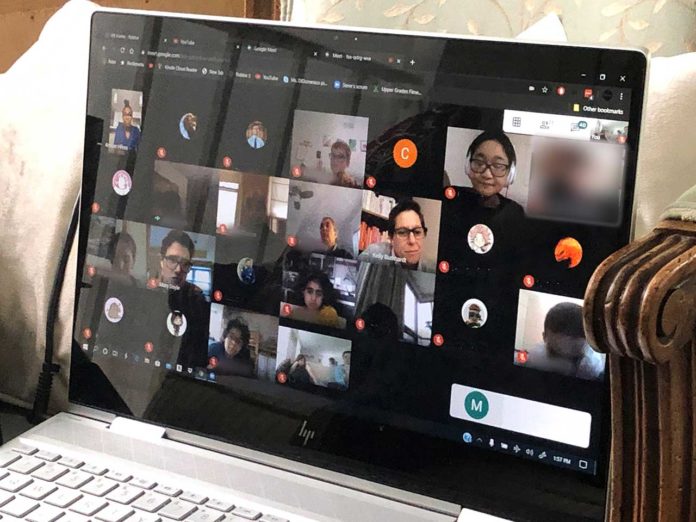
Thanks to the service-learning organization Need in Deed, students in Philadelphia public and charter schools are able to choose an educational topic as part of a year-long service project. Through research and debate, students from third to eighth grade choose a social issue to study, such as gun violence prevention or the history of racism.
In the 2019-2020 academic year, students in Meg Merlini’s fourth-grade class at General George A. McCall School chose to study discrimination as it manifests in homelessness, bullying and antisemitism. Their project expanded to cover LGBTQ history and discrimination when a couple of students read a news article about kids who were being bullied because of their LGBTQ identities.
For the LGBTQ history section of their study, Merlini invited guest speakers Kelly Burkhardt and Mary Doyle, who work in the Philadelphia District Attorney’s Office, to teach the students about sexual orientation and gender identity.
“We started out with, ‘have you ever met an LGBTQ person before,’” Burkhardt said. “Someone raised their hand and said, ‘yeah, my uncle,’ or’ my neighbor.’ So it was breaking down those glass walls a little bit.”
Through community-driven social and political projects, Need in Deed strives to enhance the education of students in Philly’s public and charter schools. Teachers and Need in Deed staff members facilitate classroom learning sessions by inviting guests to speak speakers, also known as community partners.
In the culmination of the students’ service project, Need in Deed typically holds a ceremony at the University of the Arts in which students present their projects. This year, Need in Deed held Virtual Shoutout! sessions via Zoom, recognizing classroom service projects and distributing awards in recognition of student work, which was broadcast live via YouTube. Merlini’s class was one of several that won the Transformation Award for completing projects that span subject matter.
“I think the most powerful thing about Need in Deed projects is this constant reflection,” Merlini said in the Virtual Shoutout!. “I hope [the students] can continue reflecting on their own beliefs, and that is where the true transformation I think happens.”
Burkhardt and Doyle were selected to present the award, but Burkhardt presented for both of them as Doyle had left to serve in the Coast Guard Reserves.
“We felt that their visit to Meg’s class, as community partners, had a significant impact on student learning,” Need in Deed Program Manager Janet Chance said in an email.
In the virtual classroom, one of Merlini’s students asked Burkhardt and Doyle what they should do if they hear one of their classmates use the word “gay” in a pejorative way.”
“I explained to them, ‘When you’re seeing someone get picked on, how does that make you feel? It probably doesn’t make you feel very good,’” Burkhardt said. “Some of the kids expressed themselves in that manner, that it’s wrong –– why pick on someone for who they are? We gave [the students] some strength in saying, ‘When you stand up to someone, I’ll bet you the person standing next to you will stand up.’”
Burkhardt and Doyle invited a few guests of their own to share their experiences and different aspects of LGBTQ history, including trans activist Deja Lynn Alvarez, ACLU Chief Equity and Inclusion Officer Amber Hikes, William Way LGBT Community Center Executive Director Christ Bartlett and a client of Burkhardt’s who experienced a hate-driven crime.
Hikes, former director of Philadelphia’s Office of LGBT Affairs, talked to Merlini’s students about the black and brown stripes in Philadelphia’s LGBTQ flag, showed them the flag and shared some of her own experiences facing discrimination.
Alvarez spoke to the students about her transgender identity and trans visibility.
“What I loved about it is, it was a way to show diversity in the LGBTQ community as well as the intersectionality,” Chance said.
Bartlett talked to Merlini’s class about significant moments in LGBTQ history, including the Stonewall riots and Annual Reminders Day, a series of pickets led by LGBTQ organizations every July 4 from 1965-1969. He spoke to the class right at the peak of Philly’s Black Lives Matter protests.
“[My students] really are able to make connections between that protest movement and the protests that are happening in Philadelphia right now,” Merlini said in the Virtual Shoutout!.
Burkhardt shared that a father of one of Merlini’s students had sent her an email relaying a conversation that he had with his son. Burkhardt quoted the student’s words:
“Rioting is part of our history as Americans, dad. Have you heard of Stonewall? That was a riot and change happened because of it. People who are gay might not be able to get married if it wasn’t for that.”
“This kid just literally put everything together,” Burkhardt said. “All the students put everything together in a moment of what’s happening in our lives as well as the LGBTQ movement.”
Chance, an openly lesbian educator, pointed out that although the passage of laws and implementation of guidelines have allowed teachers to cover topics such as LGBTQ history, “it still takes a lot of courage to address these topics because there’s still social pressure in schools not to,” she explained. “Teachers have to make the courageous choice if they’re going to pursue that with their class.”